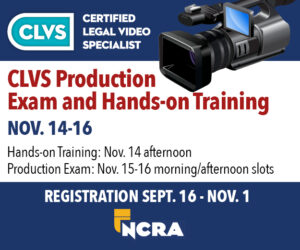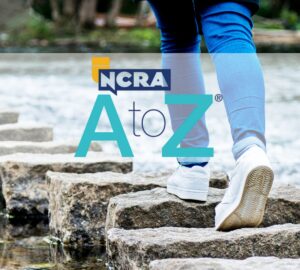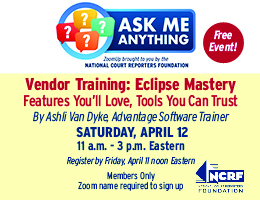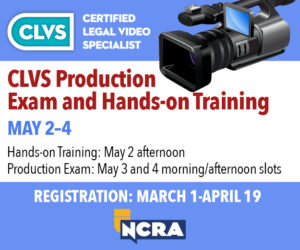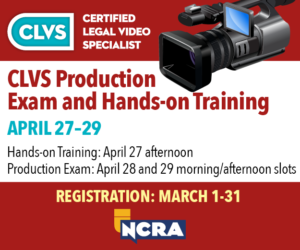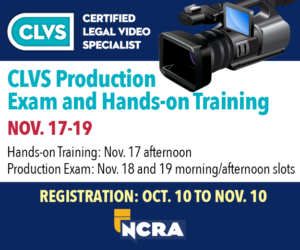While much of the focus of court reporters is on capturing the spoken word through writing, there is another NCRA certified group that strongly complements the work of stenographers – certified legal videographers. As the name suggests, they focus on capturing proceedings through video. What better partnership could there be to provide the complete record.
What
The court reporting profession is very important to the legal process because it creates an exact record of what happened and what was said. Transcripts from a deposition or trial serve as a permanent record of the proceedings. With the need for an accurate and complete record, a legal videographer is sometimes included to capture the event. The use of video adds the opportunity to record facial expressions, long pauses, and nuances of personality and character that cannot be captured in writing.
The use of video in the legal environment is growing. Legal videographers can freelance or work directly for a court reporting firm. They can record depositions, the signing of legal documentation such as wills or real estate transfers, and courtroom cases. Occasionally evidence that has not been introduced as an exhibit might need to be captured, for example, the state of immovable property. Opportunities are unlimited, and job growth is predicted to be above average through 2024.
Who
Legal videographers come from any number of backgrounds, but typically they have an appreciation of technology and are comfortable using video equipment and software. They might be new to the field, perhaps career changers, or experienced videographers comfortable capturing a wedding or producing a documentary. While the skills employed will differ, the ability to use a professional camera, an understanding of the importance of capturing the event first time, and an interest in maintaining their skills is paramount.
Why
Attorneys, judges, and litigants will use details from the transcripts, so it is of absolute importance that the visual record is accurate. While tertiary education is always attractive to employers, being hired requires technical proficiency and an understanding of what is required, as well as the ability to interact professionally. Because of the importance of quality work, in most cases, certification is required to secure employment. Being certified proves that you have the knowledge and skills to produce a quality record. Certified Legal Video Specialist (CLVS) is the main certification used for this type of work. There are three steps to becoming certified, and they are shown below.
The three steps to certification
The first step requires attendance at a three-day seminar that is offered twice a year – in either spring or fall at the National Court Reporters Association headquarters in Reston, Va., and in summer at the annual NCRA Convention & Expo. The next opportunity will be March 2017.
The seminar provides detailed training and hands-on demonstrations, as well as a textbook to help you prepare for the written exam. The first day is an introduction to the profession, discussing the use of video in a deposition, and reviewing the different kinds of equipment used. The second day focuses on the CLVS Code of Ethics, the CLVS Standards for Video Depositions, and the applicable Federal Rules of Civil Procedure. The final day provides time for a hands-on workshop, either at an introductory level or at a more advanced level.
The second and third steps are the written test and production exam. Many chose to do the written test first to be sure they have covered all the basics. Written tests must be taken at Pearson Vue testing centers during one of four testing periods (January, April, July, and October) annually. The test includes 100 multiple-choice questions and at least 70 of them must be correctly answered in order to pass. The areas being tested cover video recording production, legal and judicial procedures, post production, office procedures, operating practices and professional development, and ethics.
The production exam is a staged deposition in order to test your ability to take a deposition. You are allowed 30 minutes in the room. Candidates can take some time to become familiar with the equipment that has been provided and then must document a brief mock deposition. The candidates are graded on their ability to provide a quality videotape of the deposition proceedings. Registration for the production exam in November 2016 is open through October 28.
Explore the world of CLVS on the CLVS Community page.
For more information about the CLVS certification program: Visit the NCRA Web page: Certified Legal Video Specialist (CLVS).
Natalie Dippenaar is NCRA’s Professional Development Program Manager. She can be reached at ndippenaar@ncra.org.












